Your game is at a critical moment, and then boom – the power flickers, your screen goes black, and all progress is lost. This frustration is all too common for gamers without proper power protection.
The best power backup for a gaming PC is a line-interactive UPS with sufficient wattage (at least 20-25% above your PC's max draw) and pure sine wave output. This provides voltage regulation and clean power, crucial for sensitive high-end components.
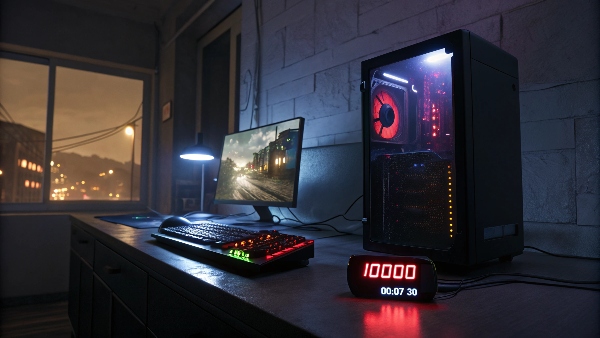
As a manufacturer with DAOPULSE for 10 years, I've seen how important clean, reliable power is, not just for big data centers but also for high-performance applications like gaming. Gamers invest heavily in their rigs – powerful CPUs, high-end graphics cards, and fast storage. These components are not only expensive but can also be sensitive to power fluctuations. An abrupt shutdown can mean lost game saves, corrupted files, or even, in rare cases, hardware damage. The "best" UPS here isn't just about keeping the lights on; it's about safeguarding that investment and ensuring uninterrupted immersion. Choosing a UPS that is a bit larger in capacity than your immediate load is a smart move. It offers a safety margin and better performance.
How big of a battery backup do I need for a gaming PC?
You know you need a UPS for your powerful gaming rig, but "how big" is the question. If it's too small, it won't offer enough protection. If it's overkill, you're spending too much.
You need a battery backup (UPS) with a wattage capacity at least 20-25% higher than your gaming PC's maximum power supply unit (PSU) rating or its measured peak power draw. For example, for a 750W PSU, aim for a 900-1000W UPS.
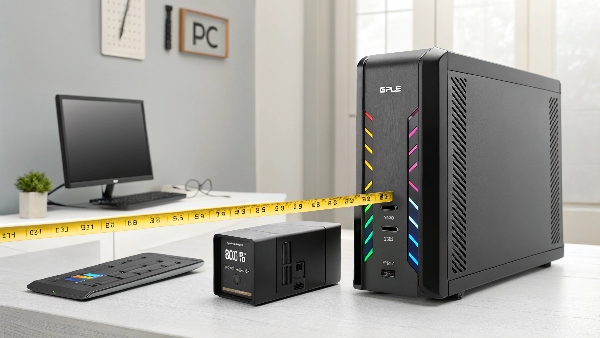
"Sizing UPS for Gaming PC")
Determining the right size UPS for a gaming PC is crucial. Here’s a more detailed approach:
- Check Your PC's Power Supply Unit (PSU): The PSU wattage (e.g., 650W, 750W, 850W, 1000W) is a good starting point. This is the maximum power your PC could draw, though it rarely uses the full amount continuously.
- Consider Actual Power Draw (Optional but more accurate): If you have a power meter, you can measure your PC's actual power consumption during intense gaming. This will likely be lower than the PSU's max rating.
- Add Peripherals: Don't forget your monitor(s), speakers, external drives, and any other essential gaming peripherals you want backed up. Add their wattage to your PC's wattage.
- Calculate Total Wattage and Add Buffer: Sum the wattage of your PC and peripherals. Then, multiply this total by 1.20 to 1.25. This 20-25% buffer is important. Gaming PCs can have sudden power spikes, and you don't want your UPS to be overloaded. A larger capacity UPS will also provide longer runtime for the same load.
At DAOPULSE, while we primarily serve large enterprises, the principle of matching capacity with a safety margin applies universally. Our UPS design and customization services always factor in these peak demands, whether for lead-acid battery UPS solutions or high-efficiency lithium battery UPS solutions. For a gaming PC with an 850W PSU and a monitor drawing 50W, the total is 900W. With a 25% buffer, you'd look for a UPS around 1125W.
| PC Component Level | Estimated PC Wattage (Gaming) | Add Monitor(s) | Total Approx. Load | Recommended UPS Wattage |
|---|---|---|---|---|
| Mid-Range Gaming PC | 300W - 500W | 30W - 60W | 330W - 560W | 400W - 700W |
| High-End Gaming PC | 500W - 800W | 50W - 100W | 550W - 900W | 660W - 1125W |
| Enthusiast Gaming PC | 800W - 1200W+ | 60W - 120W | 860W - 1320W+ | 1050W - 1650W+ |
How long will a 1000W UPS power a PC for?
You're considering a 1000W UPS, which sounds substantial. But "how long" will it actually keep your PC running when the lights go out, giving you time to save your game and shut down?
A 1000W UPS will power a typical gaming PC (drawing 300-600W) for about 5-15 minutes. Runtime depends heavily on the PC's actual power draw and the UPS battery's capacity (Amp-hours), not just its Watt rating.
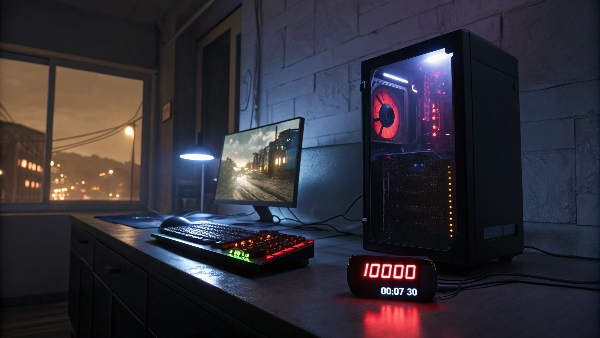
A 1000W UPS rating tells you the maximum load it can support, not directly how long it will last. The runtime is determined by two main things:
- The Actual Load: How much power your gaming PC and connected peripherals are drawing at that moment. A PC idling on the desktop uses far less power than when it's running a demanding game.
- The UPS Battery Capacity: This is measured in Amp-hours (Ah) or Volt-Amp-hours (VAh). A 1000W UPS could have different battery configurations.
Let's say your gaming PC setup (PC + monitor) draws an average of 400 Watts while gaming. A typical 1000W UPS might have around 144-192 VAh of battery capacity (e.g., two 12V 7Ah batteries = 168VAh, or two 12V 9Ah batteries = 216VAh).
Theoretically, with 168Wh and a 400W load, you'd get 168Wh / 400W = 0.42 hours, or about 25 minutes. However, inverter inefficiency and battery health reduce this. Realistically, for a 400W gaming load on a standard 1000W (which might be a 1500VA model) UPS, you're likely looking at 7-12 minutes of runtime. If your PC draws 600W, this could drop to 4-8 minutes. This is usually enough time to save your game and perform an orderly shutdown. At DAOPULSE, we help clients understand that for longer runtimes, larger battery banks or more efficient lithium battery UPS solutions are needed, which is a key consideration in our UPS design and customization.
Is 1000VA UPS enough for a gaming PC?
You've seen 1000VA UPS units, and they seem like a popular size. But is that "VA" rating sufficient for your power-hungry gaming setup, or are you risking an overload during intense gameplay?
A 1000VA UPS is often enough for a mid-range gaming PC. It typically provides 600-700 Watts of power. Check your PC's total wattage (including monitor) to ensure it's below this. For high-end PCs, a 1500VA (900W+) UPS is safer.
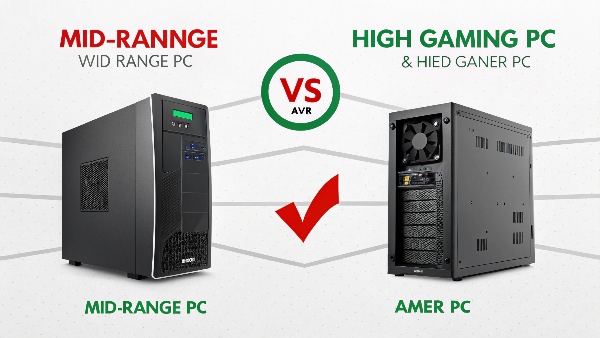
A 1000VA UPS typically has a real power output (Wattage) of around 600W to 700W. This is because VA (Volt-Amps) is apparent power, and Watts is true power, with the difference being the power factor (Watts = VA * Power Factor). Many modern electronics have a power factor of 0.6 to 0.7 for consumer-grade UPS units.
So, is 600-700W enough for your gaming PC?
- Mid-Range Gaming PC: If your PC has a PSU around 500-650W and your typical gaming load (including monitor) is, say, 300-450W, then a 1000VA (600-700W) UPS will likely be sufficient. It provides a decent buffer.
- High-End Gaming PC: If you have a more powerful GPU and CPU, with a PSU of 750W or higher, and your gaming load approaches 500-600W or more, a 1000VA UPS is cutting it close. During power spikes, it might get overloaded. For these setups, a 1500VA UPS (which typically offers around 900-1000W) is a much safer and better recommendation.
As an OEM/ODM manufacturer, DAOPULSE always advises clients to focus on the Watt rating first. We ensure our UPS systems, whether for wholesalers or large infrastructure projects, clearly state both VA and Watt capacities. This transparency is crucial for making the right choice. For gamers, always err on the side of slightly more capacity to handle those demanding game sessions and ensure system stability.
How big of a power supply do I need for gaming PC?
Beyond the UPS, the foundation of your PC's power is its internal Power Supply Unit (PSU). Choosing the right PSU size is critical for stability and future upgrades, but how do you determine the correct wattage?
For a gaming PC, choose a PSU with a wattage 150-200W higher than the combined peak wattage of your CPU and GPU. This provides headroom for other components, efficiency, and future upgrades. Don't just sum parts; allow a buffer.
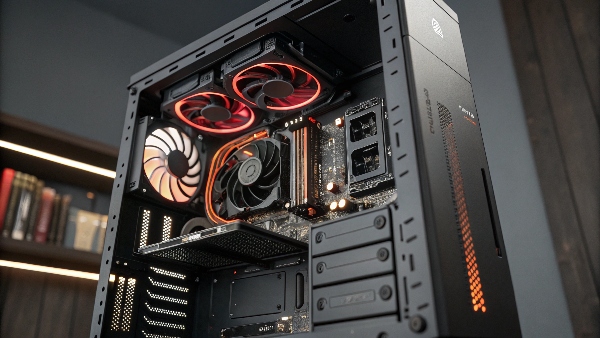
While this question is about the PC's internal Power Supply Unit (PSU)1, not the external UPS, it's closely related because the PSU's rating directly influences the UPS size you'll need.
Here's how to approach PSU sizing for a gaming PC:
- Identify Key Components: Your CPU and Graphics Card (GPU) are the biggest power consumers. Note their TDP (Thermal Design Power) or recommended PSU wattage from their manufacturers.
- Estimate Total System Draw: Add the CPU and GPU wattages. Then add an estimated 50-100W for the motherboard, RAM, storage (SSDs/HDDs), fans, and RGB lighting.
- Add a Generous Buffer: This is crucial. You don't want your PSU running at 90-100% capacity. This stresses the PSU, reduces efficiency, and leaves no room for power spikes or future component upgrades (like a more powerful GPU). Aim for a PSU that can comfortably provide 1.5x to 2x your estimated system draw, or at least 150-200W above the sum of your CPU and GPU's peak draw. For example, if your CPU is 125W and GPU is 300W (total 425W), a 650W-750W PSU would be a good choice.
- Consider Quality and Efficiency: Don't just go for raw wattage. A high-quality PSU (e.g., 80 PLUS Bronze, Gold, or Platinum certified2) will deliver cleaner power more efficiently and reliably.
At DAOPULSE, while we manufacture UPS systems, we understand the entire power chain. The quality of the PSU in the connected equipment impacts how it interacts with the UPS. A good PSU makes the UPS's job easier. This principle of ensuring components are not stressed to their limits is something we apply in our own patented technology development for UPS systems, aiming for longevity and reliability.
Conclusion
For gaming PCs, a line-interactive, pure sine wave UPS, sized 20-25% above your system's peak draw, offers the best protection. This safeguards your investment and ensures uninterrupted gameplay.

